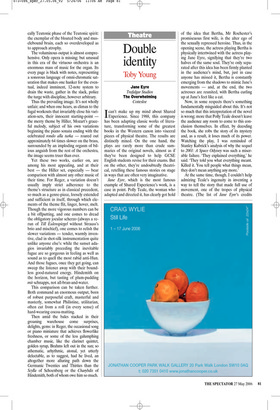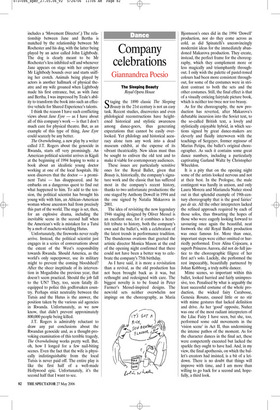Double identity
Toby Young
Jane Eyre Trafalgar Studios The Overwhelming Cottesloe Ican’t make up my mind about Shared Experience. Since 1988, this company has been adapting classic works of literature, transforming some of the greatest books in the Western canon into visceral pieces of physical theatre. The results are distinctly mixed. On the one hand, the plays are rarely more than crude summaries of the original novels, almost as if they’ve been designed to help GCSE English students revise for their exams. But on the other, they’re undoubtedly theatrical, retelling these famous stories on stage in ways that are often very imaginative.
Jane Eyre, which is the most famous example of Shared Experience’s work, is a case in point. Polly Teale, the woman who adapted and directed it, has clearly got hold of the idea that Bertha, Mr Rochester’s promiscuous first wife, is the alter ego of the sexually repressed heroine. Thus, in the opening scene, the actress playing Bertha is physically intertwined with the actress playing Jane Eyre, signifying that they’re two halves of the same soul. They’re only separated after this idea has been firmly planted in the audience’s mind, but, just in case anyone has missed it, Bertha is constantly emerging from the shadows to mimic Jane’s movements — and, at the end, the two actresses are reunited, with Bertha curling up at Jane’s feet like a cat.
Now, in some respects there’s something fundamentally misguided about this. It’s not so much that this interpretation of the novel is wrong; more that Polly Teale doesn’t leave the audience any room to come to this conclusion themselves. In effect, by decoding the book, she robs the story of its mystery and, as a result, it loses much of its power. Watching the play, I was reminded of Stanley Kubrick’s analysis of why the sequel to 2001: A Space Odyssey was such a miserable failure. ‘They explained everything,’ he said. ‘They told you what everything meant. Killed it. You tell people what things mean, they don’t mean anything any more.’ At the same time, though, I couldn’t help admiring Teale’s ingenuity in inventing a way to tell the story that made full use of movement, one of the tropes of physical theatre. (The list of Jane Eyre’s credits includes a ‘Movement Director’.) The relationship between Jane and Bertha is matched by the relationship between Mr Rochester and his dog, with the latter being played by an actor called John Lightbody. The dog is clearly meant to be Mr Rochester’s less inhibited self and whenever Jane appears on stage with her employer Mr Lightbody bounds over and starts sniffing her crotch. Animals being played by actors is another hallmark of physical theatre and my wife groaned when Lightbody made his first entrance, but, as with Jane and Bertha, I was impressed by Teale’s ability to transform the book into such an effective vehicle for Shared Experience’s talents.
I think the reason I have such conflicting views about Jane Eyre — as I have about all of this company’s work — is that I don’t much care for physical theatre. But, as an example of this type of thing, Jane Eyre could scarcely be any better.
The Overwhelming, a new play by a writer called J.T. Rogers about the genocide in Rwanda, starts off very promisingly. An American political scientist arrives in Kigali at the beginning of 1994 hoping to write a book about an idealistic young doctor working at one of the local hospitals. He soon discovers that the doctor — a prominent Tutsi — has disappeared, and he embarks on a dangerous quest to find out what happened to him. To add to the tension, the political scientist has brought his young wife with him, an African–American woman whose ancestors hail from precisely this part of the world. The stage is set, then, for an explosive drama, including the inevitable scene in the second half when the American’s wife is mistaken for a Tutsi by a mob of machete-wielding Hutus.
Unfortunately, the fireworks never really arrive. Instead, the political scientist just engages in a series of conversations about the extent of the West’s responsibility towards Rwanda. Should America, as the world’s only superpower, use its military might to prevent the coming bloodshed? After the sheer ineptitude of its intervention in Mogadishu the previous year, that doesn’t seem practical. Should the job fall to the UN? They, too, seem fatally illequipped to police this godforsaken country. Perhaps strict neutrality between the Tutsis and the Hutus is the answer, the position taken by the various aid agencies in Rwanda. Unfortunately, as we now know, that didn’t prevent approximately 800,000 people being killed.
J.T. Rogers is admirably reluctant to draw any pat conclusions about the Rwandan genocide and, as a thought-provoking examination of this terrible tragedy, The Overwhelming works pretty well. But, oh, how I longed for a few nail-biting scenes. Even the fact that the wife is physically indistinguishable from the local Tutsis is never paid off. The entire play is like the first half of a well-made Hollywood epic. Unfortunately, it’s the second half that I want to see.











































































































 Previous page
Previous page